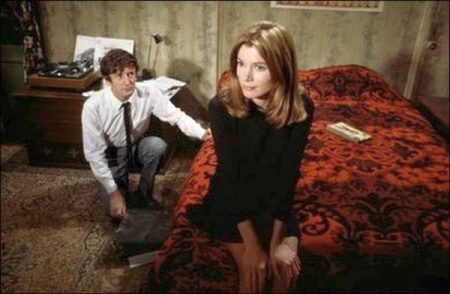Taglines: The past is the present and future in Alain Resnais’ new time machine.
Je t’aime, Je t’aime movie storyline. In this provocative sci-fi drama from Alain Resnais, a man wakes up in a hospital after an attempted suicide. He has invented a time machine that has proven effective, but only transports the subject back in time for one minute. Upon his release, he gets his hands on the machine to go back to a time he fondly remembers spending with a woman he apparently has feelings about.
The two stroll on the beach before she leaves for Scotland. He follows her, but tragedy ensues and it is not clear if he has killed her or if she died an accidental death. The time-machine angle of the film features a dreamlike series of flashbacks making it unclear if the action is presently unfolding or is merely a vague memory from the past.
Claude Ridder (Claude Rich) is leaving hospital after an attempt at suicide, when he is asked to participate in a mysterious experiment in time travel by a private research body. They have succeeded in sending mice back unharmed for periods of one minute, but need to send a human back to confirm the subject did actually revisit the past. Claude agrees, but instead of returning promptly as the mice had done, he re-experiences many episodes from his past in a highly disjointed and fragmented manner, in interludes of seconds or minutes.
Claude’s observations culminate in his admission – which he later says he fabricated – that he had killed his terminally ill life partner, Catrine (Olga Georges-Picot), painlessly by gas poisoning, upon seeing her in her sleep – for the first time in her life – completely happy and without fear, and his attempted suicide upon then finding he could not live with, or without, her. The researchers wait an hour before concluding they will never get him back, and his fate is left ambiguous.
Je t’aime, Je t’aime (“I Love You, I Love You”) is a 1968 French science fiction film directed by Alain Resnais from a screenplay by Jacques Sternberg. The plot centres on Claude Ridder (Claude Rich) who is asked to participate in a mysterious experiment in time travel when he leaves the hospital after a suicide attempt. The experiment, intended to return him after one minute of observing the past, instead causes him to experience his past in a disjointed fashion.
The film was listed to compete at the 1968 Cannes Film Festival, but the festival was cancelled due to the countrywide wildcat strike that occurred in May 1968 in France. While seldom ranked among Resnais’s best works, Je t’aime, je t’aime has received positive reviews since its release. Its synopsis has been cited as an influence on the 2004 Michel Gondry film Eternal Sunshine of the Spotless Mind.
Film Review for Je t’aime, Je t’aime
This 1968 film’s title, “Je T’aime, Je T’aime,” translated into English is “I love you, I love you,” which suggests that what you are about to watch very well could be a sappy French romance. Nothing could be further from the truth. Instead, director Alain Resnais’ film is a futuristic psychological drama and a deep dive into the disturbing nuances of a damaged relationship and the suicidal mind.
We begin near the end with the entrance of our brooding main character, Claude Ridder (Claude Rich). He is exiting the hospital after a suicide attempt a few days prior. Outside of the hospital, a group of men show up to take him to Crespel Research Center. He handles his quietly forceful capture with an indifference reminiscent of Albert Camus’ Meursault.
The man in charge of Crespel explains that they study time, and because of Claude’s “fuck life” tendencies, he is their ideal candidate. He will be transported into the past via a large brain-like vessel that they call Nero. Here Resnais nods to the hokeyness of contemporary science fiction by including a giant brain straight out of a B movie shocker playing at the drive-in, but he also tastefully obscures Nero in shadows. Simply slapping the sci-fi label on “Je T’aime, Je T’aime,” as many websites do, is far too hasty and undermines the real gravity of its plot.
Claude is promised that the trip back in time will last only a minute. But at the one-minute mark, the scientists declare him “lost,” and Claude is left to bounce from memory to memory. What follows is an hour-long montage of Claude’s memories in which we witness his relationship with his girlfriend Catrine (Olga Georges-Picot) grow for a time and then shrink into one-sided dependence and eventually indifference on her part. Viewers must resist getting too caught up in the flashy, fractured narrative and keep in mind that Claude has just survived a suicide attempt. And in Claude’s selfish eyes, Catrine is the direct cause of that suicide attempt.
His memories are surely biased or altered from how events in their relationship actually occurred and it’s important to stress that the version of their relationship we witness—that’s to say, which memories are allowed to surface and when—is also possibly being decided by the men who kidnapped him and sent him into the past and then got him lost in time. But one thing is for sure: Claude was fixated on Catrine, and his fixation eventually pushed her away. And what they had, because of Claude’s obsession, wasn’t actually love at all.
Je t’aime, Je t’aime (1968)
Directed by: Alain Resnais
Starring: Claude Rich, Olga Georges-Picot, Anouk Ferjac, Alain MacMoy, Vania Vilers, Ray Verhaeghe, Van Doude, Yves Kerboul, Dominique Rozan, Claire Duhamel, Irène Tunc
Screenplay by: Jacques Sternberg, Alain Resnais
Cinematography by: Jean Boffety
Film Editing by: Albert Jurgenson, Colette Leloup
Art Direction by: Jacques Dugied, Pace
Music by: Krzysztof Penderecki
MPAA Rating: None.
Distributed by: 20th Century Fox (1968) (France), Bleeding Light Film Group (USA)
Release Date: April 26, 1968
Views: 213



